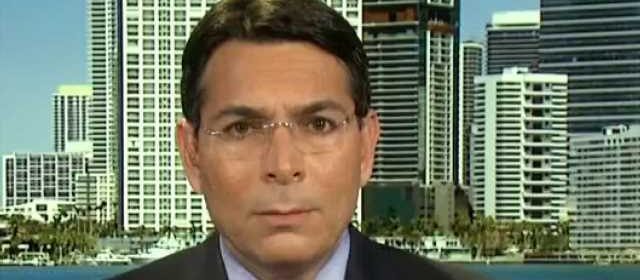Ex-Israeli Ambassador Danon's Big Idea: Biden should maintain strong stance on Iran, partner with allies

Iran plans to increase uranium enrichment
Center for Security Policy CEO Fred Fleitz provides insight on ‘America’s News HQ.’
The Big Idea is a series of Q&As with top lawmakers and figures.
The Trump administration announced new sanctions this week against companies related to Iran’s metals industry as the Islamic nation said they are looking to enrich uranium to 20%. With President-elect Joe Biden taking office, former Israeli Ambassador to the U.N. Danny Danon hopes that the new administration will keep sanctions in place until Iran ceases its progress and renounces plans of acquiring nuclear weapons.
Biden has said that he would like to form a new agreement with Iran to deal with their nuclear aspirations. A previous agreement was reached in 2015 when Biden was vice president under President Barack Obama. President Trump pulled the U.S. out of the multi-nation agreement, which Israel opposed before the U.S. ever joined it.
Since then, the Trump administration has brokered peace agreements between Israel and several Arab nations, all of whom recognize Iran as a threat in the region.
Danon, who is now chair of World Likud — an organization that represents the positions of Israeli Prime Minister Benjamin Netanyahu's Likud Party — discussed these issues in an interview with Fox News, which can be found below. It has been lightly edited for clarity.
Q: With a new U.S. president taking office in less than two weeks, how would you like to see the Biden administration handle the Iran nuclear situation?
Danon: First I hope that the new administration will speak to allies in the region — Israel and Arab countries — before they take any steps regarding Iran. I think that would be the wise thing to do. And we hope that they will not try to appease the Iranians because we know that they’re lying all the way around.
It’s very rare that you have the Israelis and many countries in the region thinking the same way. I think that the U.S. should listen to their allies, respect their opinions, and regarding the regime you saw that – in 2014 even when they signed the JCPOA (Joint Comprehensive Plan of Action) they were lying all the way around.
RON WYDEN'S BIG IDEA: DEFEND SECTION 230 AND PREVENT A 'GOVERNMENT SPEECH POLICE'
Q: I understand that you’d like to see them continue sanctions moving forward. What would you want to see before any sanctions are lifted?
Danon: We know that sanctions are very effective. We have nothing against the Iranian people, but the regime has threatened to do something against the U.S., against Israel. We hope the U.S. will continue to lead and get more European countries that will join. Then we can actually talk about changing the agreement. That’s the only way to do it. Some of the European countries that have signatures on the JCPOA they acknowledge that the Iranians are breaching the agreement and seeing if it’s feasible for them to support more sanctions and a tougher approach regarding Iran.
Q: Joe Biden has indicated that he wants to reenter an agreement with Iran. Should that happen, what specific requirements would you want to see included?
Danon: We have the idea of reentering the agreement and then negotiating with the Iranians. This is a mistake. That’s not how you handle business. You don’t enter the agreement and then negotiate. You do it in advance before you enter the agreement and I hope that will be the approach. And once there will be negotiations then I think we should be discussing a number of issues that are problematic. First is the issue of enriching uranium, which we just got a public announcement by Tehran that they are enriching to a level of 20% and from 20% it’s really easy to jump to higher levels that will lead you to a nuclear bomb.
The second issue is the ballistic missile tests that they have been conducting for the last few years. The third issue is funding terrorism. They are paying their proxies billions of dollars every year to promote terrorism all over the world. I think those should be the main issues we address if there will be any kind of negotiations.
Q: The Trump administration has recently brokered landmark agreements between Israel and several Arab nations in recent months. In reaching these agreements, how important was it that the U.S. shared Israeli and Arab concerns about Iran?
Danon: I think it was crucial. You can say a lot of things about the agreement with Iran, but one good that happened is it brought us together. Today we have very close relationships. I served in the U.N. for five years, we did it quietly but now we are doing it publicly. And I think you’ll hear the same voices now publicly coming [from] Riyadh, Abu Dhabi, Tel Aviv, and many other countries in the Middle East.
Q: What do you think could happen if Joe Biden enters into an agreement with the same terms as the old one that President Obama entered, without consulting with Israel or Arabs?
Danon: So I hope and I believe that will not happen. I also, when you follow the messages coming from the language of the president-elect, the language is a little bit different than it was from then. They’re not saying they will rejoin the agreement immediately. I think we will hear a different language and we welcome it.
CLICK HERE TO GET THE FOX NEWS APP
But before it will happen, Israel will do whatever is necessary to defend ourselves. and for us allowing Iran to become nuclear is not an option. We said it in the past, we say it out loud today, and we will continue to say it in the future.
Source: Read Full Article

